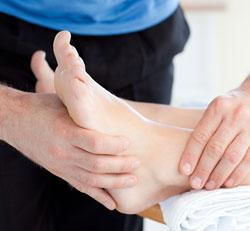If you have diabetes, small cuts or sores on your feet can result in infections that can threaten your feet and legs. Katy, TX podiatrist, Scott Burdge, DPM, offers diabetic foot care and encourages his patients to pay attention to the condition of their feet. He shares information about several conditions that can lead to trouble.
Daily examinations are important
As your disease progresses, you may no longer have any feeling in your feet and may not be able to tell if you experience an injury. Since even minor injuries and conditions can lead to infections, it's important to examine your feet every day for potential signs of trouble, including:
- Blisters and Calluses: Blisters and calluses are relatively minor problems when you don't have diabetes, but can quickly turn into sores and ulcers if you have the disease. Blisters, calluses, sores and ulcers, no matter how small they are, must be treated promptly to prevent infections.
- Irritated Skin: Your skin may become irritated first before blisters or calluses develop. Look for red spots where your feet rub against your shoes. If you notice those spots, it's time to change your footwear.
- Ingrown Toenails: Ingrown toenails are a problem even if you don't have diabetes, but can be particularly serious if you are diabetic. Call your Katy podiatrist as soon as possible if you notice that a corner of a toenail has grown into your skin. In the future, make an appointment with his office when you need your nails trimmed.
- Changes in Color: Color changes are never a good sign. Red streaks on the skin may be a sign that you have an infection, while pale or blue skin means that you have a circulation problem. Black skin indicates that the tissue in your foot is dead or dying. If you notice any of these signs, call your foot doctor immediately, or visit the emergency room if you can't get in touch with him.
- New Sensations: If you notice tingling, numbness, a "pins and needle" feeling in the feet, burning or complete lack of feeling, let your podiatrist know. These symptoms may indicate nerve damage or a problem with your nerves.
Don't put your feet at risk. Visit your Katy, TX podiatrist, Scott Burdge, DPM, for regular diabetic foot care. Call him at (281) 829-9315 to make an appointment.
